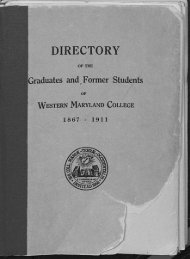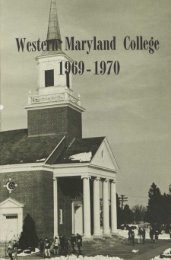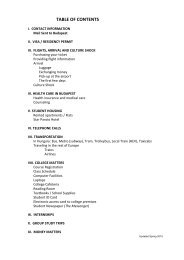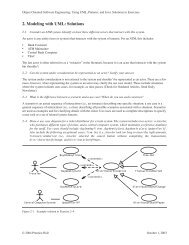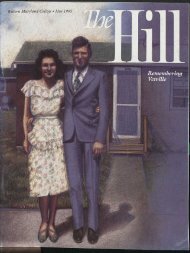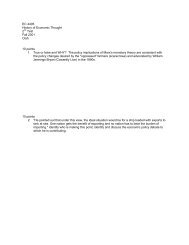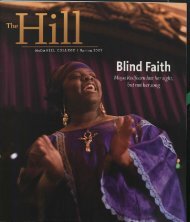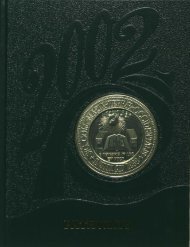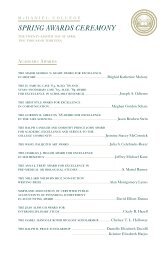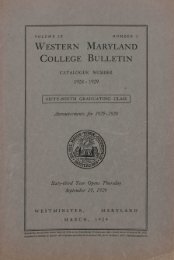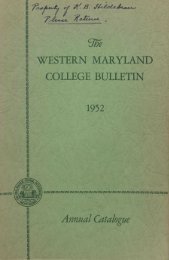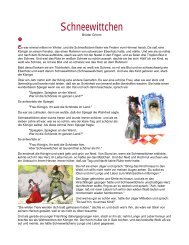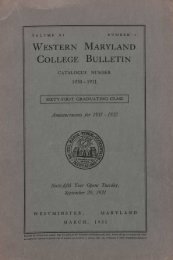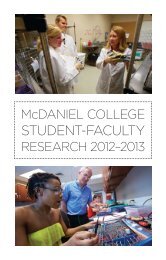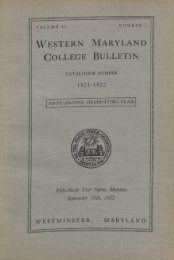Many professors are research-minded specialistsern college or university president has often had todouble or triple his administrative staff since 1950.Positions that never existed before at most institutions,such as campus architects, computer programmers,government liaison officials, and deansof financial aid, have sprung up. The number ofinstitutions holding membership in the AmericanCollege Public Relations Association, to cite onlyone example, has risen from 591 in 1950 to morethan 1,000 this year-including nearly 3,000 individualworkers in the public relations and fundraisingfield.A whole new profession, that of the college "developmentofficer," has virtually been created inthe past 15 years to help the president, who is usuallya transplanted scholar, with the twin problemsof institutional growth and fund-raising. Accordingto Eldredge Hiller, executive director of the AmericanAssociation of Fund-Raising Counsel, "I n 1950very few colleges and uni versities, except those inthe Ivy League and scattered wealthy institutions,had directors or vice presidents of development.Now there are very few institutions of higher learningthat do not." In addition, many schools thathave been faced with the necessity of special developmentprojects or huge capital campaigns havesought expertise and temporary personnel from outsidedevelopment consultants. The number of majorfirms in this field has increased from 10 to 26 since1950, and virtually every firm's staff has growndramatically over the years.Many alumni, faculty members, and studentswho have watched the president's suite of officesexpand have decried the "growing bureaucracy."What was once "old President Doe" is now "TheAdministration," assailed on aU sides as a driving,impersonal, remote organization whose purposesand procedures are largely alien to the traditionalworld of academe.No doubt there is some truth to such charges. Intheir pursuit of dollars to raise faculty salaries andto pay [or better facilities, a number of top officialsat America's COlleges and universities have hadinsufficient time for educational problems, and somehave been more concerned with business efficiencythan with producing intelligent, sensible humanbeings. However, no one has yet suggested how"prexy" can be his old, sweet, leisurely, scholarlyself and also a dynamic, farsighted administrato~who can successfully meet the new challenges a.unprecedented, radical, and constant change.One president in the Midwest recently said: "Theengineering faculty wants a nuclear reactor. Thearts faculty needs a new theater. The students wantnew dormitories and a bigger psychiatric consultingoffice. The alumni want a better faculty and a newgymnasium. And they all expect me to producethese out of a single office with one secretary and asmall filing cabinet, while maintaining friendly contactswith them all. I need a magic lantern."Another president, at a small college in NewEngland, said: "The faculty and students claimthey don't see much of me any more. Same havebecame vituperative and others have wondered if Ireally still care about them and the learning process.I was a teacher for 18 years. I miss them-and myscholarly work-terribly."T_.~."-o,~",,_""changed almost as much as the administrators', Ifnot mare, in the new period of rapid growth andradical change.For the mast part, scholars are no longer rcga~edas ivory-tower dreamers, divorced from SOciety.They are now important, even indispensable, rr:~nand women, holding keys to international sectln y,economic growth, better health, and cultural e~cellence.For the first time in decades, most of rheirsalaries are approaching respectability. (The nationalaverage of facul ty salaries has risen from$5,311 in 1950 to $9,317 in 1965, accord.in~:0:Csurvey conducted by the American AssociatwUniversity Professors.) The best of them are pursuedby business, government, and oth~r coll:~~~They travel frequently to speak at national rba nferences on modern music or contemporary u
problems, and to international conferences on particlephysics or literature.In the classroom, they are seldom the professors ofthe past: the witty, cultured gentlemen and ladiesortedious pedants-who know Greek, Latin, French,literature, art, music, and history fairly well. Theyare now earnest, expert specialists who know algebraicgeometry or international monetary economics-and not much more than that-cxceediug£y well.Sensing America's needs, a growing number ofthem are attracted to research, and many prefer itto teaching. And those who are not auracted areoften pushed by an academic "rating system"which, in effect, gives its highest rewards and promotionsto people who conduct research and writeabout the results they achieve. "Publish or perish"is the professors' succinct, if somewhat overstated,way of describing how the system operates.Since many of the scholars-and especially theyoungest instructors-are more dedicated and "focused"than their predecessors of yesteryear, theallegiance of professors has to a large degree shiftedfrom their college and university to their academicdiscipline. A radio-astronomer first, a Siwash professorsecond, might be a fair way of putting it.There is much talk about giving control of theuniversities back to the faculties, but there are strongindications that, when the opportunity is offered,the faculty members don't want it. Academic decision-makinginvolves committee work, elaborate investigations,and lengthy deliberations-time awayfrom their laboratories and books. Besides, manyprofessors fully expect to move soon, to anothercollege or to industry or government, so why botherabout the curriculum or rules of student conduct?Then, too, some of them plead an inability to takepart in broad decision-making since they are expertin only one limited area. "I'm a geologist," said oneprofessor in the West. "What would I know aboutadmissions policies or student demonstrations?"Professors have had to narrow their scholarly interestschiefly because knowledge has advanced to apoint where it is no longer possible to master morethan a tiny portion of it. Physicist Randall Whaley,who is now chancellor of the University of Missouriat Kansas City, has observed: "There is about100 times as much to know now as was availablein 1900. By the year 2000, there will be over1,000 times as much." (Since 1950 the number ofscholarly periodicals has increased from 45,000 to
- Page 1 and 2:
~~STERN MARYLAND COLLEGE I ~~o/ht~W
- Page 3 and 4:
TheWESTERN MARYLAND COLLEGEMagazine
- Page 5 and 6:
A Gift forthe CollegeCollectionBalt
- Page 7 and 8:
meat aU choice cuts. From this poin
- Page 9 and 10:
.'30to 40 miles for clinics on the
- Page 11 and 12:
PAINT POSTSTHE CATALYSTPledges of G
- Page 13 and 14: On the Hit!New TrusteeArthur G. Bro
- Page 15 and 16: Hopkins TakesLast GameBasketball te
- Page 17 and 18: 19"Mrs. Otto Dieffenbach(Madeleine
- Page 19 and 20: Wayne Crackel! works for the YMCA i
- Page 22 and 23: The President's ColumnTribute toMan
- Page 24 and 25: Communication is many things; telep
- Page 26: period of old age, it might be cons
- Page 29 and 30: -- •Pagenine
- Page 31 and 32: Art is long they sayAnd the time is
- Page 33 and 34: Members of the Fund Committee meet
- Page 35 and 36: SPORTSClower's TearnHas TroubleUnli
- Page 37 and 38: During a recent dinner party at Car
- Page 39 and 40: SUpport equipment engineering divis
- Page 41 and 42: infant in March, 1964. She is also
- Page 43 and 44: portunity tool) StanleyHowell an El
- Page 45: cral science and biology.Thank you
- Page 48 and 49: Dasuet McCready, president of the W
- Page 50 and 51: The bridge is a symbol in literatur
- Page 52 and 53: Thi.s i.s one of th.e chemistry lab
- Page 54 and 55: Moberly wrote, "An honest intention
- Page 56 and 57: all sorts of odd jobs such as peddl
- Page 58 and 59: I".,"".'""""~ silentlv.unnoticej'~,
- Page 61 and 62: of scientists and engineers that ou
- Page 63: y, but 15 years ago there were roug
- Page 67 and 68: DRA WINGS BY ARNO STERNGLASSconsequ
- Page 69 and 70: The students reactto "the system" w
- Page 71 and 72: The alumnilament: We don't Tecogniz
- Page 73 and 74: William S. Coffin, Jr.Campus Respon
- Page 75 and 76: SPORTSTERROR NINEIS DIFFERENTCoach
- Page 77 and 78: serving as interim Pastor of a smal
- Page 79 and 80: travel. The next newsletter will te
- Page 81 and 82: this summer. \Vhile there, they wil
- Page 83 and 84: The MagazineServiceCommencementCrec
- Page 85 and 86: TheWESTERN MARYLAND COLLEGEMagazine
- Page 87 and 88: Sally Reinecke chats with students
- Page 89 and 90: Thie is the Trapper Creek Job Corps
- Page 91 and 92: BOLIVIAPIONEER(S)by Joy Holloway, '
- Page 93 and 94: Joy says "Welcomethe right.to San P
- Page 95 and 96: '/'his article, printed in the May
- Page 97 and 98: June 6, 1966, Commencementpage-fift
- Page 99 and 100: DepartmentsGive HonorsTwenty-one me
- Page 101 and 102: y David Carrasco, '67RAIN HINDERSTE
- Page 103 and 104: ~~h:~~;~1i~~~lf. ft~l~~b/:~:~~:~n (
- Page 105 and 106: Nova Scotia, Gaspe Peninsula and Qu
- Page 107 and 108: Maryland National Guard's "Dandy Fi
- Page 109 and 110: Family Living at North Hagerstown H
- Page 111 and 112: the birth of their first child, Kei
- Page 113: Andy was bam in the morning on the
- Page 117 and 118:
TheWESTERN MARYLAND COLLEGEMagazine
- Page 119:
AlumniFund Breaks RecordThis succes
- Page 122 and 123:
-,Martha O. VincentPaul F. W!L"'~r'
- Page 124 and 125:
11133-$997.00·"Webster M. Stray~rF
- Page 126 and 127:
*~~\~~:1}a{:~i~b1f5!~i~!;~~71~~Dryd
- Page 128 and 129:
1953-$804.45Ebie !l-laytrott Greenh
- Page 130 and 131:
·CornerstonepagesixteenOGCentutyCl
- Page 132 and 133:
·.\Iara Dil.on WalterSylvia A. Whi
- Page 135 and 136:
WESTERN MARYLAND COLLEGEOctober, 19
- Page 137 and 138:
TheWESTERN MARYLAND COLLEGEMagazine
- Page 139 and 140:
Introduction: the editorUNREST ON C
- Page 141 and 142:
form of prejudice involved in all s
- Page 143 and 144:
the adjustments toward college life
- Page 145 and 146:
To Catcha Fish byD,,;dLC.rrasco,'67
- Page 147 and 148:
"WMC Curriculum: Overstructured and
- Page 149 and 150:
New Look for Religious Organization
- Page 151 and 152:
vocational requirements in preparat
- Page 153 and 154:
SPORTSSidelineWoreby David Carrasco
- Page 155 and 156:
seeLos Angeles for part of the summ
- Page 157 and 158:
John Z. Dlsh, 28 Westmoreland Stree
- Page 159 and 160:
college president). Bill and his wi
- Page 161 and 162:
(that's what she wrote!), Clair/! M
- Page 163 and 164:
Harry has been a member of the Boar
- Page 165 and 166:
call as he would be happy to share
- Page 167 and 168:
is serving a 12-month tour with the
- Page 169:
MAY DAY 1966



